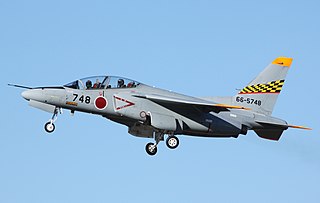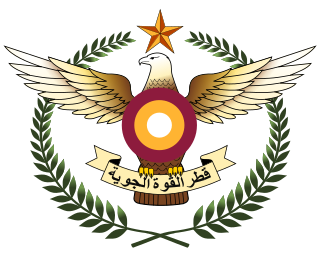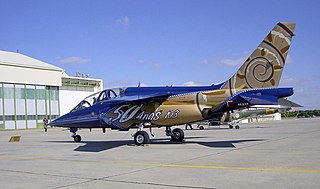
The BAE Systems Hawk is a British single-engine, jet-powered advanced trainer aircraft. It was first flown at Dunsfold, Surrey, in 1974 as the Hawker Siddeley Hawk, and subsequently produced by its successor companies, British Aerospace and BAE Systems, respectively. It has been used in a training capacity and as a low-cost combat aircraft.

A trainer is a class of aircraft designed specifically to facilitate flight training of pilots and aircrews. The use of a dedicated trainer aircraft with additional safety features—such as tandem flight controls, forgiving flight characteristics and a simplified cockpit arrangement—allows pilots-in-training to safely advance their real-time piloting, navigation and warfighting skills without the danger of overextending their abilities alone in a fully featured aircraft.
In differential topology, the jet bundle is a certain construction that makes a new smooth fiber bundle out of a given smooth fiber bundle. It makes it possible to write differential equations on sections of a fiber bundle in an invariant form. Jets may also be seen as the coordinate free versions of Taylor expansions.

Boundary Bay Airport or Vancouver/Boundary Bay Airport is located beside Boundary Bay and 2.5 nautical miles east of Ladner in Delta, British Columbia, Canada, 8.5 NM south southeast of Vancouver and close to the Canada-U.S. border. The airport, which opened July 11, 1983, serves mostly general aviation and includes facilities for aircraft maintenance, flight training, parking, and air traffic control training. Boundary Bay is Canada's fifth busiest airport by total aircraft movements, and the country's busiest general aviation airport. It is the location of the former Canadian Forces Station Ladner.

The Dassault/Dornier Alpha Jet is a light attack jet and advanced jet trainer co-manufactured by Dassault Aviation of France and Dornier Flugzeugwerke of Germany. It was developed specifically to perform the trainer and light attack missions, as well as to perform these duties more ideally than the first generation of jet trainers that preceded it. Following a competition, a design submitted by a team comprising Breguet Aviation, Dassault Aviation, and Dornier Flugzeugwerke, initially designated as the TA501, was selected and subsequently produced as the Alpha Jet.

The Kawasaki T-4 is a Japanese subsonic intermediate jet trainer aircraft developed and manufactured by the commercial conglomerate Kawasaki Heavy Industries. Its sole operator is the Japan Air Self-Defense Force (JASDF), in part due to historic restrictions on the exporting of military hardware. In addition to its primary training mission, the T-4 has been used by the JASDF's Blue Impulse aerobatic team as well as liaison duties with most fighter units. The first XT-4 prototype flew on 29 July 1985, while the first production aircraft was delivered during September 1988.

The IA-63 Pampa is an advanced jet trainer with combat capability, produced in Argentina by Fabrica Militar de Aviones (FMA) with assistance from Dornier of Germany.

The Talent is a multiple unit railcar manufactured by Bombardier that was developed by Waggonfabrik Talbot in Aachen shortly before the company was acquired by Bombardier in 1995. The name Talent is an acronym in German for TALbot LEichter Nahverkehrs Triebwagen.

A jet trainer is a jet aircraft for use as a trainer, whether for basic or advanced flight training. Jet trainers are either custom designs or modifications of existing aircraft. With the introduction of military jet-powered aircraft towards the end of the World War II it became a requirement to train pilots in the handling of such aircraft.
Alpha waves are neural oscillations in the frequency range of 8–12 Hz arising from the synchronous and coherent electrical activity of thalamic pacemaker cells in humans. They are also called Berger's waves after the founder of EEG.
The Alphabet Route was a coalition of railroads connecting the Midwest United States with the Northeast, as a freight alternate to the four major systems: the Pennsylvania Railroad, New York Central Railroad, Erie Railroad and Baltimore and Ohio Railroad. Named for the many-lettered initials of the participating railroads, it used the following systems from west to east:

The Qatar Emiri Air Force is the air arm of the armed forces of the Persian Gulf state of Qatar.

The PZL I-22 Iryda, otherwise known as the PZL M93 Iryda and PZL M96 Iryda, was a twin-engine, two-seat Polish military jet trainer aircraft developed and produced by Polish aviation company PZL Mielec.

The Cameroon Air Force is the air force of Cameroon. The Cameroon Air Force, along with the Cameroon Army, the Cameroon Navy, the National Gendarmerie, and the Presidential Guard make up the Cameroonian Armed Forces.

The Asas De Portugal was a flight demonstration team created in 1977 integrated with Esquadra 103 of the Portuguese Air Force. It was Portugal's national aerobatic flying team and flew two ex-German Air Force Dassault-Breguet/Dornier Alpha Jets.

The 103 Squadron "Caracóis" is a jet advanced training squadron of the Portuguese Air Force. Prior to 1978, the "Caracóis" also received following designations: 22 Squadron, Esquadra de Instrução Complementar de Pilotagem (EICP) and Esquadra de Instrução Complementar de Pilotagem em Aviões de Combate (EICPAC).

PlaneSense is a fractional aircraft ownership program managed by PlaneSense, Inc. and based in Portsmouth, New Hampshire, United States. As of the beginning of 2018, they manage a civilian fleet of 40 total program aircraft, made up of thirty-five Pilatus PC-12 aircraft, 4 Nextant 400 XTi jets and two Pilatus PC-24 jet. Six Pilatus PC-24 jets are scheduled to be delivered between the years 2018 and 2020. The PlaneSense fractional program provides private air transportation, primarily within the United States, Canada, Mexico, The Bahamas, the islands of the Caribbean and more recently, Cuba. PlaneSense guarantees departure times as soon as 8 hours after a flight request, depending on the size of the aircraft share owned for domestic flights on non-peak days. PlaneSense, inc. is not, itself, an air charter provider or commercial air carrier, but charter flights can be arranged through its sister company, Cobalt Air.
IF2: Interceptor Force 2, commonly called Interceptor Force 2, is a 2002 Sci Fi Pictures science-fiction TV movie on the Sci Fi Channel. A sequel to the 1999 Sci Fi Channel telefilm Interceptor Force, it is directed by Phillip Roth, and stars Olivier Gruner, Roger R. Cross, Adrienne Wilkinson, Elizabeth Gracen and Nigel Bennett. Government-trained soldiers called the Interceptors are assigned to look at a crash site of an alien spacecraft in Russia where they find a 7-foot-tall (2.1 m) alien that can change shape.

On 26 January 2015, an F-16 jet fighter of the Hellenic Air Force crashed into the flight line at Los Llanos Air Base in Albacete, Spain, killing 11 people: the two crew members and nine on the ground. Twenty-one others, all on the ground, were also injured.














